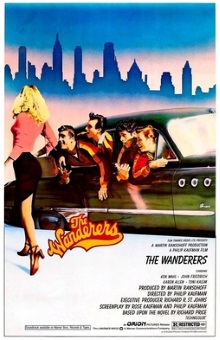
The last work we saw of director Philip Kaufman was his 1978 remake of Invasion of the Body Snatchers. This one is an adaptation of a novel about street gangs in the 1960s, which means that preposterous as things can get in this film, at least some parts of it are based on real life events. It also stars Ken Wahl, who some people from my generation may recognize from the television series Wiseguy but I’ve never seen him anywhere else.
The Wanderers are a street gang based in an Italian neighborhood of the Bronx and it soon becomes clear that there are many such gangs. Wahl plays Richie, the leader of the Wanderers and his best friend in it is Joey. One rival gang is the Fordham Baldies, who as their name implies, all shave their heads. Conflict brews between them when one of the Wanderers tries to leave to join the Baldies as they are stronger and more numerous. A big and tough newcomer to the neighborhood named Perry helps beat back the Baldies and he becomes a new member of the Wanderers. At school we see many other gangs, mostly organized along ethnic lines. An argument in class with the African-American Del Bombers prompts the Wanderers to ask other gangs for help in an upcoming big fight. At the same time, Richie has to manage the affections of his girlfriend Despie, whose father is the local mob boss while the powerful and mysterious Ducky Boys lurk menacingly in the background.
Though plenty of stuff happens in this film, it’s not the plot that is important. Instead this is a sort of slice-of-life presentation of what growing up in a street gang was like, albeit one with lots of room for dramatic and cartoonish exaggerations. In this world that Kaufman has created, everyone is a member of one gang or another and I especially loved how this point is reinforced by pointing out that even Despie’s father, Chubby Galasso, is the head of his gang with Hawaiian shirts as gang colors. The question of racism never comes up. It is understood that everyone always sides with their own people and stereotypes are accepted as being true. The Wongs for example are a gang of Asian-Americans who all have the surname Wong and every single one of them knows kung fu. It’s politically incorrect and reflects a naive understanding of society, yet at the same time it perfectly captures how a kid growing up in that time and place sees the streets.
For a film about generally pretty dumb characters, The Wanderers is also smarter and more subtle than I’d expect. As juvenile as the characters starts out being, this is also a story of them growing up and learning what it means to become adults. Richie learns to stop his womanizing ways and settle down to marriage. Trite as it seems, the local gangs realize that their fights against each other are mere play-acting when compared against the real malevolence of the Ducky Boys. I loved how even the violent Baldies are forced by a clever military recruiter to channel their energy in more socially constructive ways. When the friends part from one another, they tell each other, “Wanderers forever,” but we know that this isn’t true and they seem to realize this themselves.
It’s also a film that filled to the brim with entertaining moments, such the awful but hilarious elbow-titting exercise the boys carry out on the main street and the teacher in school encouraging the groups to call each other names. The scene in which the boys accidentally wander into Ducky Boys territory takes on an abruptly different tone, more like something out of a zombie movie than anything else, and makes no sense. Yet it’s clearly put there as a sort of personal signature of the director. All in all, this is an unexpectedly wonderful film that nicely captures a sense of the times it covers and makes for a great watch for anyone who loves coming of age films, as this one certainly counts as, or feels like indulging a bit of 60s nostalgia.